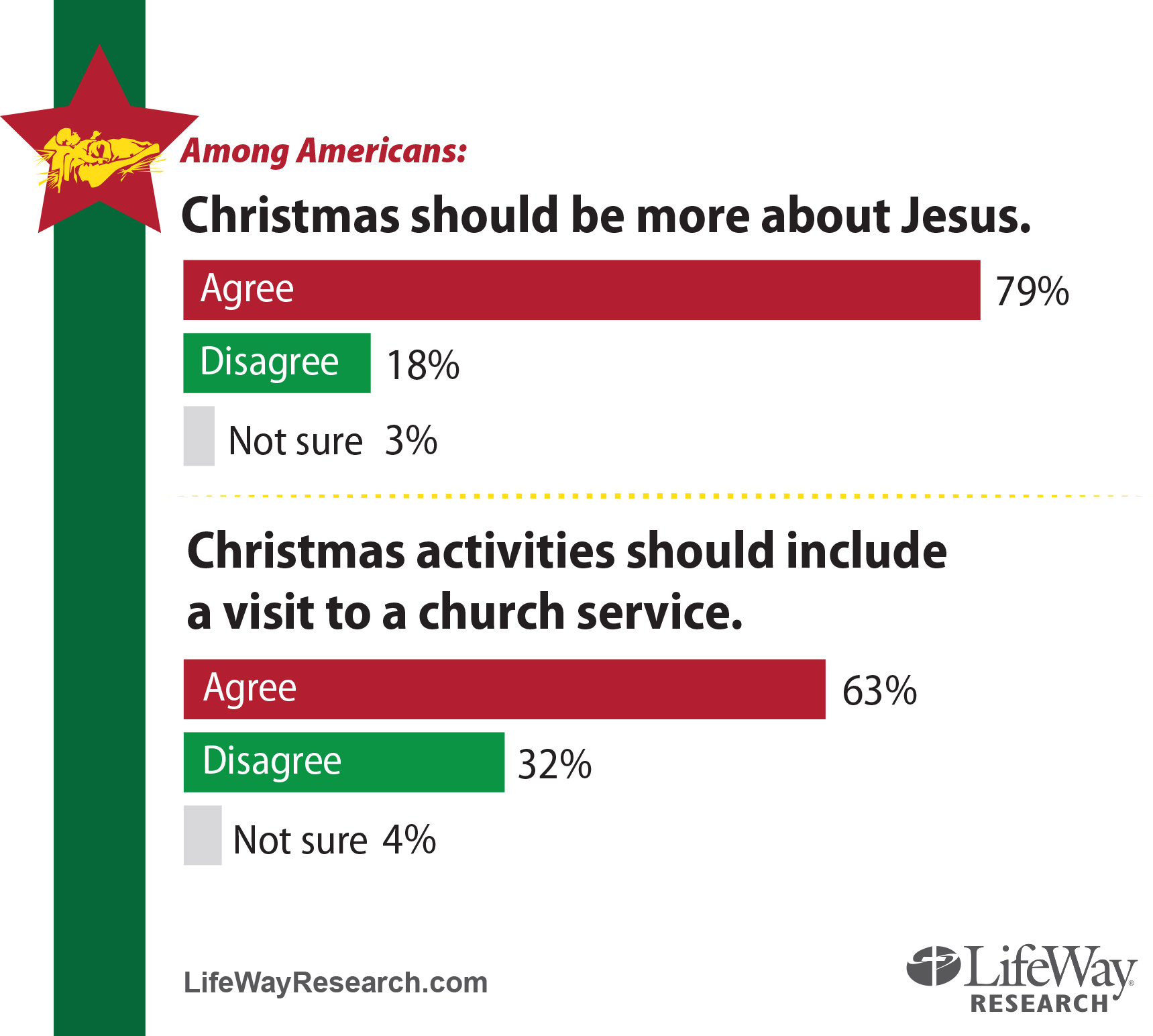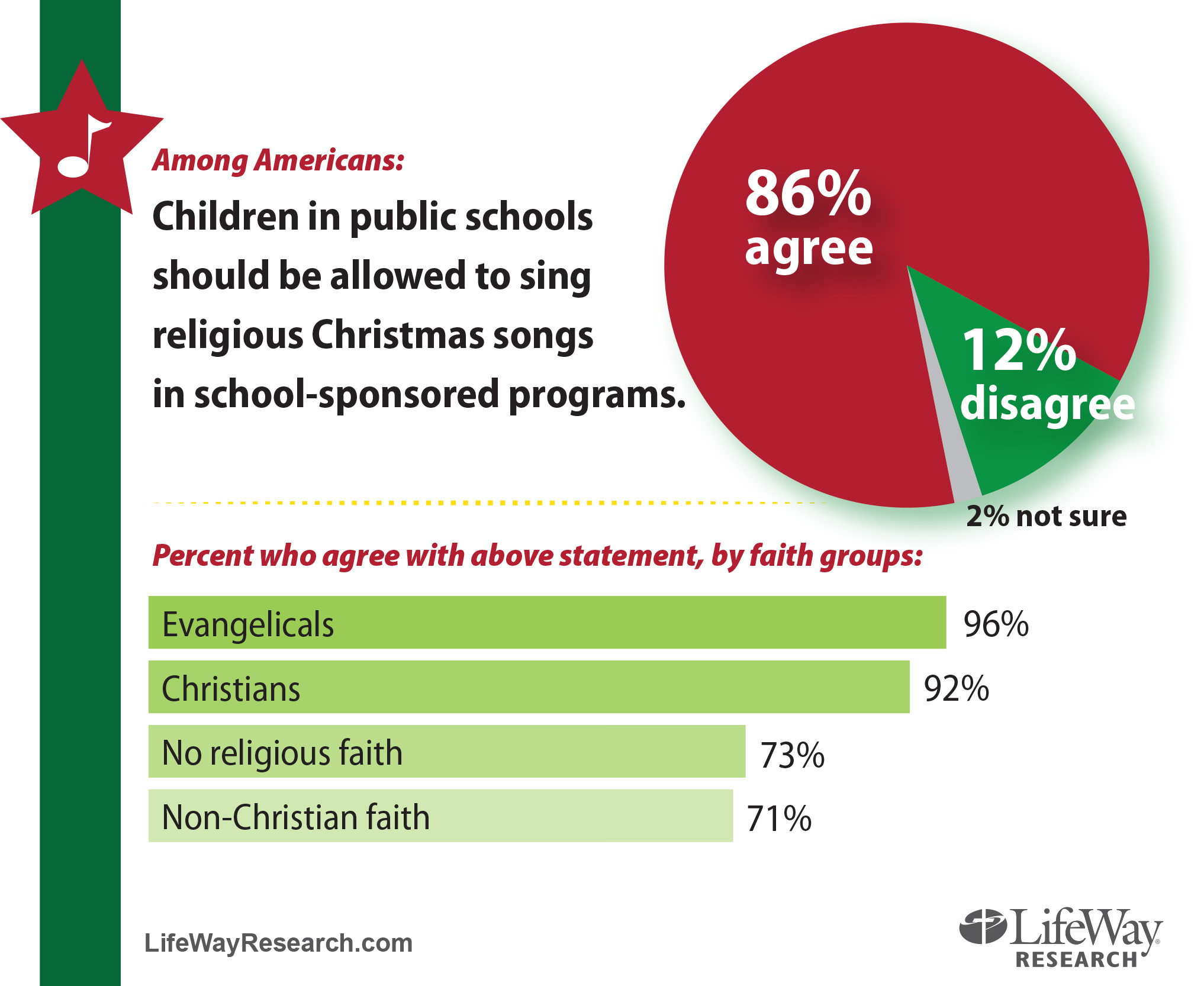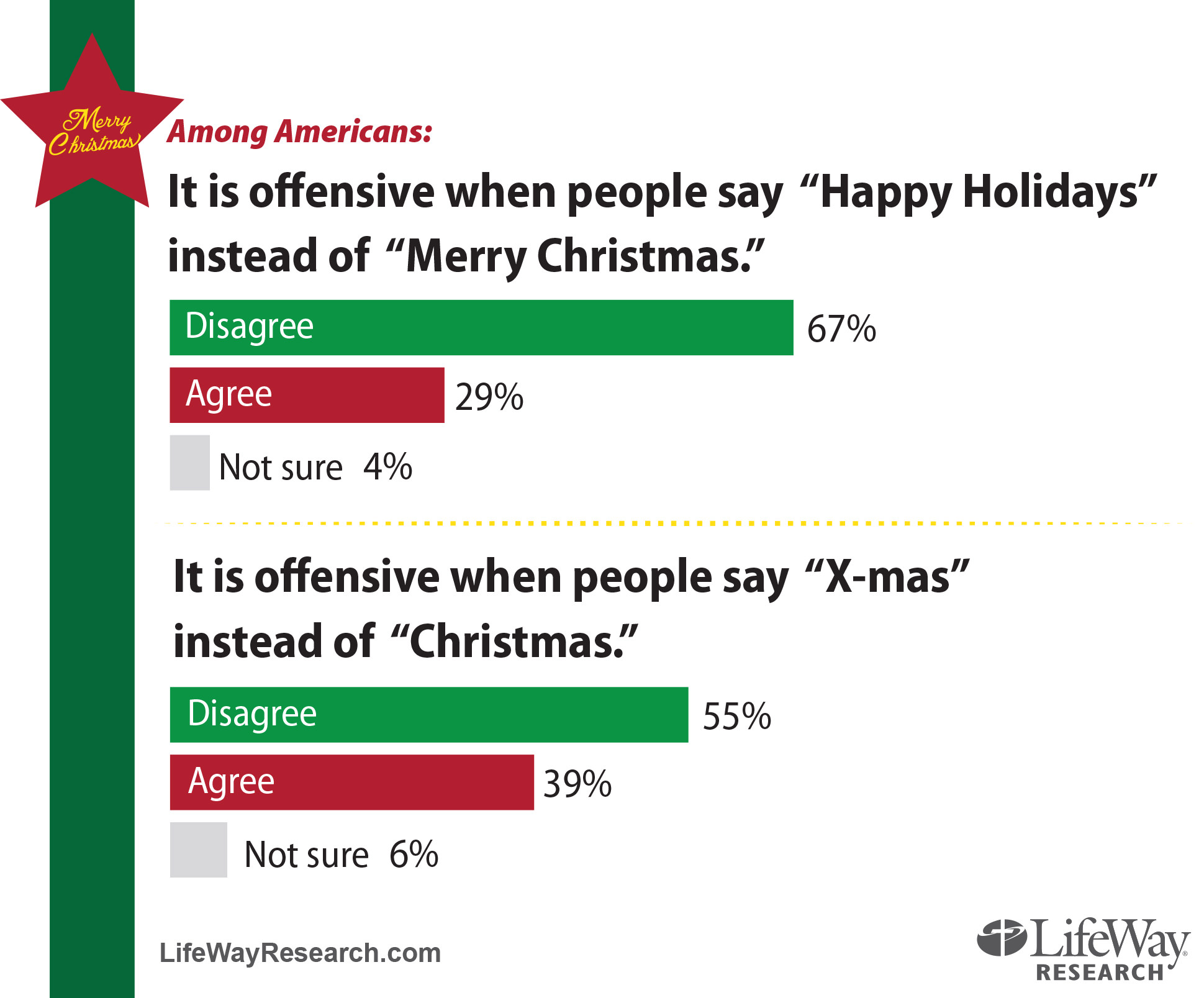By Bob Smietana
Christmas is a time for family, faith and a little bit of controversy.
This year, it’s a set of atheist billboards featuring a fictional letter from a little girl who has lost her religion and says she’s too old for fairy tales.
“Dear Santa,” the billboard reads, “All I want for Christmas is to skip church.”
No thanks, say most Americans, according to a new survey from Nashville-based Lifeway Research.
Most Americans believe Christmas goes better with a visit to church, religious Christmas songs in public school concerts, and more focus on Jesus. And while there’s much banter on cable TV talk shows about a “War on Christmas,” most Americans are fine when people wish them “Happy Holidays.”
All these findings are included in a new survey from Nashville-based Lifeway Research, which asked 1,000 Americans about their views on Christmas in a phone survey Sept. 26 to Oct. 5, 2014.
“Christmas traditions that have nothing to do with the Christian faith continue to multiply,” says Scott McConnell, vice-president of Lifeway Research. “Still, most Americans want more of Jesus in their Christmas rather than less.”
Among the findings:
Church remains an essential part of Christmas
Nearly two-thirds (63 percent) of Americans agree Christmas should include a trip to church. A third (32 percent) disagree, while 4 percent are unsure.
Younger Americans are least interested in church at Christmas time. Fewer than four in 10 (38 percent) of those 18 to 24 say church is an essential part of Christmas, followed by 55 percent of those 25 to 34.
Christians (77 percent) are more likely to agree than those from other faiths (44 percent) and the Nones (28 percent).
Americans prefer the sacred to the secular at Christmas
Eight out of 10 Americans (79 percent) agree with the statement: “Christmas should be more about Jesus.” About one in five (18 percent) disagree. A few (3 percent) are not sure.
Southerners (86 percent) are more likely to agree than Midwesterners (76 percent) and those in the West (69 percent).
Older Americans are more interested in focusing on Jesus at Christmas than younger Americans. Almost nine in 10 Americans who are over 65 (88 percent) agree. Among those 18 to 24, the number drops to six in 10 (61 percent).
Americans want to keep Christ in Christmas. Younger people aren’t so sure.
Seven in 10 Americans believe “Christmas would be a better experience if it had a more Christian focus.” One in four (26 percent) disagree, while four percent are not sure. Three quarters of women (73 percent) agree and two thirds of men (66 percent) agree.
Younger Americans—those 18 to 24 (46 percent), and 25 to 34 (57 percent) –are less likely to agree than those 35 to 44 (70 percent) and 65 plus (83 percent).
Americans want to let school kids sing “Silent Night”
Most Americans (86 percent) say children in public schools should be allowed to sing religious Christmas songs in school-sponsored musicals. About one in 10 (12 percent) disagree. Two percent are not sure.
Nine in 10 women (89 percent) and eight in 10 men (83 percent) agree. So do most Westerners (80 percent) and even more of those in the Northeast (90 percent) and South (88 percent)
Most younger Americans—those 18 to 34—(80 percent) agree, as do 9 in 10 of those 35 and older
Even many Nones—those who claim no religious faith—don’t seem to mind religious Christmas songs in school. Three quarters (73 percent) of Nones agree school kids should be allowed to sing religious songs in Christmas concerts. So do most Christians (92 percent), almost all (96 percent) Evangelicals, and even those from other faiths (71 percent).
Most people are fine with Happy Holidays.
One of the staples of the “War on Christmas” debates is the fact that some store clerks and businesses have substituted “Happy Holidays” for “Merry Christmas.” But few Americans seem to mind “Happy Holidays.”
Less than a third (29 percent) agree with the statement, “It is offensive when people say Happy Holidays instead of Merry Christmas.” Two-thirds (67 percent) disagree. Four percent are not sure.
Four in 10 evangelicals (41 percent) and about a third of Christians (35 percent) say the phrase is offensive. That drops to one in five (20 percent) for people of other faiths, and one in 10 (11 percent) for Nones.
Some are bothered by “X-mas.”
Using the term “X-mas” in place of Christmas bothers Americans more than “Happy Holidays.” About four in 10 (39 percent) say using “X-mas” is offensive. More than half (55 percent) disagree, while 6 percent are not sure.
Women (43 percent) are more likely to be offended by X-mas than men (36 percent.) And more than half of Americans age 55 to 64 (52 percent) are offended by X-mas.
Younger Americans don’t seem to mind X-mas. About one in five (18 percent) of those 18 to 24, and a third (35 percent) of those 25 to 34 find the phrase offensive.
About a quarter (26 percent) of Hispanic Americans say using X-Mas is offensive. Whites (44 percent) are more likely to find the phrase offensive, as are African Americans (39 percent).
About half of Christians (47 percent) say they agree, along with about a third (32 percent) of people of other faiths. Only one in five (19 percent) of Nones are bothered by X-mas.
Meanwhile, more Protestants (51 percent) than Catholics (37 percent) take offense.
Theology remains a bit shaky, even at Christmas.
Traditional Christian theology, based on the Gospel of John, teaches Jesus existed with God the Father at the beginning. “He was with God in the beginning,” says John 1:2. But, Americans aren’t so clear about the details of the incarnation and the Trinity.
A little over half (56 percent) agree with the statement, “God’s son existed before Jesus was born in Bethlehem.” Three in 10 (29 percent) disagree. Fifteen percent are not sure.
Those living in the Northeast (64 percent) are more likely to agree than those in the Midwest (44 percent) or West (52 percent).
Young Americans are less likely to agree Christ existed prior to His birth. About half (48 percent) of those 18 to 44 agree, but that number jumps to nearly two-thirds (64 percent) for those over 44 years.
Evangelicals (70 percent) have the highest agreement. Christians (64 percent) are more likely to agree than those from other faiths (52 percent) and the Nones (31
percent).
“The entire Christian narrative is fulfilled in Jesus further humbling himself to become obedient to the point of death on a cross,” says McConnell. “Without Jesus coming to take the punishment for sin men deserved, there would be no point to celebrating his birth.”

Bob Smietana
Bob is the former senior writer for Lifeway Research. In September 2018, he joined Religion News Service, where he currently serves as a national writer.
Methodology
The phone survey of Americans was conducted Sept. 26–Oct. 5, 2014. The calling utilized Random Digit Dialing. Sixty percent of completes were among landlines and 40 percent among cell phones. Maximum quotas and slight weights were used for gender, region, age, ethnicity, and education to more accurately reflect the population. The completed sample is 1,000 surveys. The sample provides 95 percent confidence that the sampling error does not exceed plus or minus 3.5 percent. Margins of error are higher in sub-groups. Those labeled Evangelicals consider themselves “a born again, evangelical, or fundamentalist Christian.” Those labeled Christian include those whose religious preference is Catholic, Protestant, Orthodox, or Non-denominational Christian.










